- Home
- Chris Ryan
Wildfire cr-2 Page 11
Wildfire cr-2 Read online
Page 11
She walked along, with no idea where she was going. She was just looking for somewhere to rest. But you couldn’t shelter in burned-out shops. She’d been in fire-damaged streets after tsunamis and floods and she knew the dangers. Charred roof beams could give way. Cracked pipes leaked gas and toxic fumes.
Bel scanned the deserted side streets. Why were there no other people around? Had they all found places to hide? Had there been an evacuation which she’d somehow missed?
She had her mobile in her hand and she repeatedly speed-dialled Ben’s number as she walked.
‘Lines are busy …’ squawked the tiny voice in her hand.
Well, of course they were. What did she expect? Of course there was no way she was going to get through.
As she put the phone away, she caught sight of her face in a shop window. It wore an expression she had seen thousands of times before. Not when she looked in her own bathroom mirror, but when she worked in disaster zones, when mothers and fathers were worrying about their loved ones. I’m alive, that expression said, but what about the others in my family?
Was Ben at the hotel? Had he tried to get into town? What if he had been up in the air? A microlight would be thrown about like a paper aeroplane in the thermals from a major fire. Even so, it was probably safer in the air than on the ground. She’d have to trust to Major Kurtis’s daughter to bring him back in one piece.
Across the green, a neon sign appeared through the smoke. It flashed on and then off, as though the power supply was faulty. The first time Bel caught the flicker of light out of the corner of her eye, she thought her mind was playing tricks. But then the sign flashed again: SWIMMING POOL.
Relief flooded through her. An open-air pool would be the safest place to be right now.
She ran across the road and up the steps and pushed through the doors of the building.
Inside it was dark. A strong reek of chemicals wiped out the smell of smoke. It was hot in here, almost as hot as it was outside. Down a short corridor, a big rectangle of blue water shimmered in the gloom.
Bel wasn’t looking for a covered pool. The risk there was that the roof might give way. But maybe there was an open-air pool at the back of the building. She headed on through.
She didn’t take any notice of the store cupboard door she passed on her left — which meant she didn’t notice the paint on it peeling in the intense heat on the other side. A steady stream of white smoke crept out under the door, covering the floor like a carpet.
Bel coughed as she became aware of a strong chemical reek. The sound echoed off the walls. She marvelled at how silent the building was. Normally at this time of day the building would ring with high-spirited screams and splashes. Goggles, shoes and bags littered the edge of the pool where swimmers had fled. She never got used to disaster zones — the deserted places, scattered with dropped possessions.
The corridor smelled strong — it was probably toxic, she thought. Fearing a chemical leak, she started to run, but her feet slipped on the wet floor and she fell sprawling.
The impact knocked all the wind out of her. When she sucked in a breath, the white smoke drifting around at ground level stung her throat like acid. She felt as if she’d been sprayed in the face with tear gas.
Behind her there was a deafening bang. The door flew off its hinges and smacked into the tiled wall opposite, scattering broken chips of ceramic. Bel’s vision cleared in time to see a ball of fire rolling towards her.
She flattened herself on the floor and started scuttling away all fours. The wet tiled surface was easy to move on and she slithered as fast as a fish. At the water’s edge she just carried right on in and powered down the pool in a strong crawl.
She was a good swimmer but her new boots pulled her down like lead weights. When her hand touched the wall at the other end she gripped it gratefully and pulled herself up.
The corridor she had come down was now a mass of flames. Fire and thick black smoke boiled out of the store cupboard. She blinked back stinging tears and saw that the insulation in the ceiling tiles was starting to smoulder, like those in the conference centre.
The swimming pool was not a safe place to be. She had to get out.
She dragged herself out of the water, onto the tiled surround. Pain shot through her shoulder: she must have bruised it badly when she fell over. She got unsteadily to her feet and looked around.
There was a door to the men’s changing rooms and another that seemed to go up to a viewing gallery. She went for the men’s changing rooms. Her boots had filled with water and squelched heavily with every step. Her skirt stuck to her legs, bandaging them together. She stumbled and nearly fell again, all the time conscious of the smoke and fumes billowing into the air around her.
The changing rooms were a mess. People had obviously left in a hurry — clothes were strewn on the benches and floors. But smoke was curling out over the cubicles. She turned back. The more confined the space, the bigger the risk of being overcome by fumes. She had more chance in the large open area of the pool room.
She went up the steps to the gallery. Her clinging skirt made her take tiny, hobbling steps. She tried ripping it, but the wet fabric was stronger than it looked. There was no time to waste. Already thick white fumes were covering the surface of the pool. She stumbled on and saw that the fire escape door was open! She stepped out onto a metal walkway. It continued in a diagonal line across the roof, with railings on each side.
Bel looked down. Smoke filled the streets like dark cotton wool. Here and there emergency lights twinkled in blue and orange.
The iron handrail was hot under her hands. Was that from the ambient summer temperature or something else? A few metres away there was a skylight in the roof. Bel went over and looked into it. The blue water of the pool was barely visible. The room below was filling with smoke of two colours, swirling together like tornado clouds on a satellite photo — black from the fire and white from the fumes given off by the reacting pool chemicals. She had got out just in time.
And she couldn’t stay up here.
She hurried along the gantry. There were other sky-lights, but she didn’t stop to look down into them. If she had, she would have noticed that the last one wasn’t positioned over the pool, but over a small room to one side. Five people lay in there, huddled together, their matching yellow T-shirts soaked in sweat.
Amy looked up as she saw a figure cross the skylight. She tried to call out but she was too weak. The fumes sapped her strength. Slowly she pulled herself over towards Timi. He was curled up as though asleep. The angry scowl was now replaced by a placid look. He had such a young face, Amy realized. He looked untroubled and innocent. She stroked his brow and he mumbled something. His eyelids fluttered but they didn’t open.
She looked up at the skylight again. It seemed to be getting darker. Joseph raised his head and looked at her. ‘I feel so sleepy, Ames …’
‘It’s all right, Joe,’ she told him. He smiled and closed his eyes, trusting in her. Just like when they were kids.
Amy felt so calm. She believed her soul would be reborn. Death was only the start of another opportunity. Or maybe it was the fumes that made her so resigned. She wasn’t sure, but she was grateful for it.
She had one stab of regret as the warm darkness folded its arms around her. The woman they had locked in the conference centre — Dr Kelland. Amy hoped she’d got out somehow before the fire …
Up on the roof, Bel didn’t have any idea how close she had come to crossing paths with the Oz Protectors again. Like her, they had gone into the pool to shelter. And like her, they had found it was a bad choice. In their case, a fatal choice.
Bel, running down the iron fire escape into the street, had made the right call. For now.
Chapter Sixteen
Ben had been to a hospital casualty unit once in his life, when he had twisted his ankle skateboarding. But the hospital in Coober Pedy was nothing like Accident and Emergency at Macclesfield General. As Ben waited for Kelly to
come back from the triage nurse, he wouldn’t have been surprised if the Flintstones had walked in.
For a start, the hospital was ten metres underground and carved out of solid rock. Most of Coober Pedy’s buildings were like this, fashioned out of old opal mines. Of course, there were no windows, so the only light came from lamps mounted at intervals along the walls. Wooden partitions sectioned off the casualty waiting area from the examination rooms. The floor seemed normal enough — just cool green lino — but when Ben looked up at the ceiling, it was disorienting to just see rough-hewn rock like the inside of a cave. There were ventilation shafts in the ceiling, covered by cones of blue plastic like upturned lampshades. Every so often the plastic cones made a skittering sound, as pebbles fell down from the surface. But at least the temperature down here was pleasantly cool.
The waiting room was quite busy. Ben found that surprising as he had hardly seen anyone on the streets above. But even more peculiar was the appearance of these patients. There were no arms in slings, or plaster casts, or even makeshift bandages like Kelly’s. Instead, most of them were wearing dark glasses, or sitting with their hands shielding their eyes.
All of them were tanned but some looked chalky pale under their tan, as though they were about to be sick. One woman sitting near Ben was holding her head in her hands and rocking backwards and forwards, moaning. Another got up and rushed to the bathroom, banging through the door in her hurry. It seemed to Ben like they had arrived in the middle of some weird kind of epidemic.
Kelly came back, her hands encased in sterile plastic bags. She looked miserable as she sat down next to Ben. ‘They haven’t finished with me yet — they’ve given me some painkillers, and once those start to work they can finish dressing the wounds. Can you get me something to eat?’
Ben stood up. ‘Sure. What do you want?’
‘A sandwich. Anything. There’s a café in the art gallery just down the road. And see if you can get some fuel. We’ll never make it back to Adelaide on what we’ve got left.’
Ben followed the sign to the lift. The doors opened and a group of people got out — a woman in a wheel-chair, caked in outback dust, being pushed by a paramedic. A man followed behind, carrying a dark brown snake that he’d chopped in half. Blood dripped from the snake’s body onto the floor. At least that looked like a normal reason to visit a hospital, but Ben shuddered. He remembered the leaflet he’d been given with all the warnings about poisonous insects and spiders and reptiles. The man must have brought the snake in to identify the venom. It could be a harsh world out here in the Australian desert.
The lift rattled upwards. As Ben went out into the street, the heat hit him like a fist. He could see why everyone lived underground here. Out of habit, he tried to call Bel on his mobile, and Major Kurtis on Kelly’s, but he couldn’t even get a signal.
He put the phones away and looked for the art gallery. He spotted its blackboard on a shed, next to a sign warning people not to walk backwards because of unmarked shafts. The shed door was open. Ben went in and down a steep staircase, into another cool, twilit cave.
At the bottom of the stairs was a rack of postcards and a sign pointing to the café. It was at the other end of the art gallery. Striplights ran along the wall, inviting the visitor into small caves of treasures. Ben glimpsed opals, brightly coloured paintings and big black and white photographs. But he was intent on reaching the café. As he smelled the aroma of baked bread, he quickened his pace. He hadn’t realized until now how hungry he was.
A lady in a T-shirt and a green apron came out of a side room, sweeping up dust that had fallen from the ceiling. ‘Can I help you?’
‘Is the café open?’ Ben asked her.
‘No, but I can open it for you if you just want sandwiches.’
‘That would be great,’ said Ben.
She leaned the broom against the wall. ‘I’ll get the key. We’ve got cheese and ham — is that all right?’
‘Fine,’ said Ben. ‘And do you have any water?’
‘Sure. I’ll give you a shout when it’s ready. You carry on looking around.’
He wandered back down the passageway and into one of the caves. It was filled with large photographs of Coober Pedy when the mines were being created. He went into another alcove, where there was an image painted directly onto the rock. A sign said it was a reproduction of a piece of aboriginal dreamtime art about the formation of opals, in which a stone in the ground was filled with fire and the colours of the rainbow.
Fire. Ben wished he could find a radio with the news on. He wanted to know what was happening in Adelaide. He came out into the main gallery and saw a payphone. He went over to it, slotted some coins in and tried Bel’s number.
‘Lines are busy. Please try again later.’
He put the receiver down and spotted a newspaper on the shelf in the phone booth. Ben doubted whether the newspapers would have got an edition out in the short time since the fire had started, but still he unfolded it and scoured it eagerly.
It was a local paper, the Coober Pedy Times. The front page headline was: MYSTERY ILLNESSES CONTINUE. Underneath, a smaller headline said: Tormented by noises. There was a picture of the stationmaster Ben had spoken to earlier.
Ben looked down the corridor at the kitchen. The café owner was taking a packet out of the fridge. He turned back to the paper.
Monty Allen, Coober Pedy’s stationmaster, has enjoyed good health all his life, but in the past three weeks has been driven mad by an unexplained ailment. ‘I was hearing this humming in my ears,’ said Mr Allen, 63. ‘It went on for hours and I couldn’t sleep so I went to the doctor. He said he’d had a surgery full of people with the same problem that morning and he didn’t know what had caused it.
There was another story further down the page: ‘Farmer loses twenty calves in a week — is mystery illness spreading to cattle?’
Ben turned the page. There was a story about bizarre weather patterns: sudden hurricanes and hail-storms. Hailstorms, thought Ben — in this heat?
‘Here you go. That’s four dollars seventy.’
The café owner was standing in front of him, holding out a bag and a four-pack of water bottles. Ben dug into his pocket for more change and peered at the unfamiliar notes. He worked out he hadn’t got enough and pulled some more out of his pocket.
As he did so, a roughly folded piece of paper fell onto the floor. The café owner picked it up and was about to hand it back to him when something caught her eye. ‘Oh, is this from here?’ She opened it out.
Ben recognized it as the photocopy the police officer had handed him, showing the charred leaflet.
‘No,’ he said, ‘I got it in Adelaide.’
‘Depression, skin diseases, strange allergies, migraines …’ She skim-read the page, muttering some of the words out loud, then handed it back to Ben. ‘My sister has had a migraine for three days and she’s sitting in casualty right now. Last week I had this terrible itching. I thought my skin was crawling with insects. I went to the doctor. He said he’d seen ten cases but he didn’t know what was causing it. So we’re making headlines in Adelaide now, are we?’
Ben had assumed that most of the text was crackpot scaremongering, but now he wasn’t so sure. He glanced at the photocopy in his hand. The headline he had noticed before leaped out:
STOP SECRET US EXPERIMENTS
In Adelaide the army had established base camps for firefighting crews all around the city. They meant that the firefighters could rest up, replenish supplies and refuel without having to go back to their station house.
Engine 33 was based at the golf course. Driving in was like entering a military installation. There was a clearly defined perimeter, where soldiers in firefighting gear patrolled with water tanks on trolleys. They had already had to put out several minor blazes, ignited by sparks blown in on smoke from the burning town.
Inside the firebreak, the whole area looked chaotic: a mass of parked fire trucks and personnel in fire-fighting gear apparentl
y milling about in all directions. But in fact it was tightly organized.
A soldier noted Engine 33’s identification number and told Petra where to park. She drove past a group of soldiers: some were tinkering about with an engine, others were replacing used breathing gear, checking rescue harnesses and testing hoses. Another engine bumped down the fairway towards them, its crew refuelled and ready for action again. The other crew waved as they went past and Wanasri watched them in the wing mirror as they reached the exit. Just then a glow of orange flared in the blackened bushes at the perimeter. The soldiers on duty immediately spotted it and dowsed it with water.
Even here, the firefighters couldn’t relax totally; the fire was never truly beaten. No matter how much water they hosed onto it, everything dried out so quickly in the blistering afternoon heat.
Petra turned onto the fairway where Victoria and Troy had been playing that morning. The golfers would have been appalled to see it now — the parched grass worn bare by the tyres of heavy vehicles and streaked with soot. The woodland had burned down to a no-man’s-land of blackened stumps.
A soldier beckoned them into a space between two other trucks, as if he was guiding a plane into a terminal building slot. Petra heaved on the wheel, manoeuvred the engine into the space and stopped.
A soldier opened the door. ‘We’ll re-equip your vehicle while you get some rest. Fifteen minutes and you’re out again. Leave the keys in the ignition in case we need to move it.’
Wanasri followed Darren out, moving across the seat in slow motion. She had never felt so tired in her life. Her muscles were aching from moving about in the heavy turnout gear, and mentally, too, she felt exhausted. She was grateful to be off duty, but daunted by the thought that she had to be back on in fifteen minutes.
Andy prodded her. ‘Come on, lazybones. There’s a bottle of iced water with my name on it and you’re in my way.’

 Global Strike
Global Strike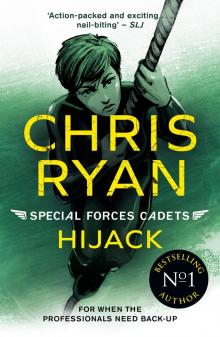 Hijack
Hijack Special Forces Cadets 2
Special Forces Cadets 2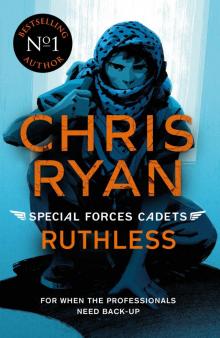 Ruthless
Ruthless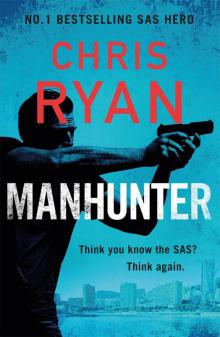 Manhunter
Manhunter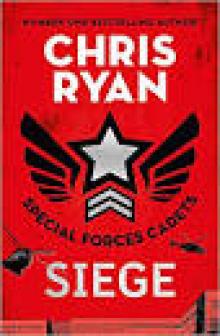 Special Forces Cadets 1
Special Forces Cadets 1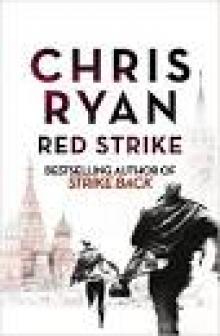 Red Strike
Red Strike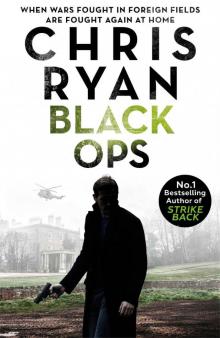 Black Ops
Black Ops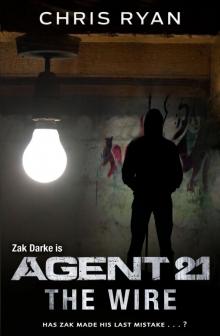 Agent 21: The Wire
Agent 21: The Wire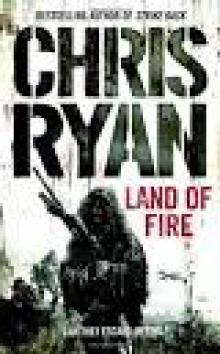 Land of Fire
Land of Fire Alpha Force: Fault Line
Alpha Force: Fault Line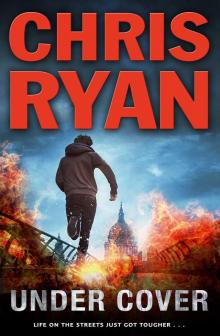 Under Cover (Agent 21)
Under Cover (Agent 21)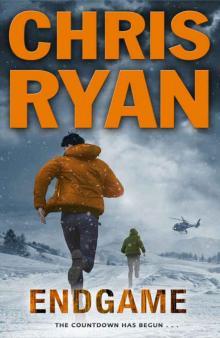 Endgame (Agent 21)
Endgame (Agent 21) Red Centre
Red Centre Blackout
Blackout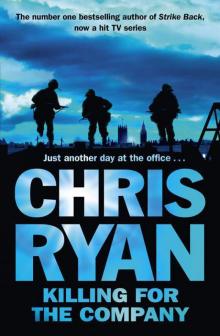 Killing for the Company
Killing for the Company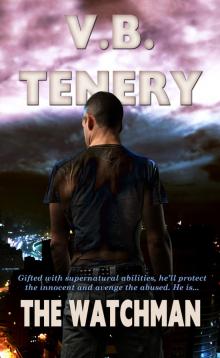 The Watchman
The Watchman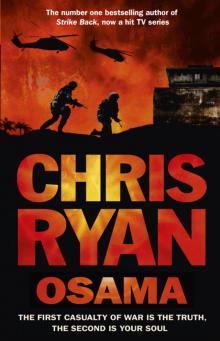 Osama
Osama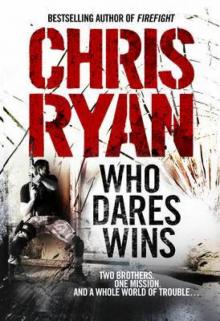 Who Dares Wins
Who Dares Wins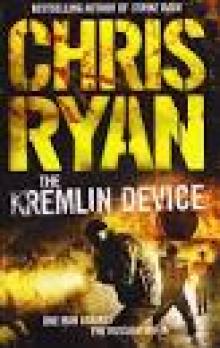 The Kremlin Device
The Kremlin Device Hunter Killer
Hunter Killer Alpha Force: Untouchable
Alpha Force: Untouchable Stand By Stand By
Stand By Stand By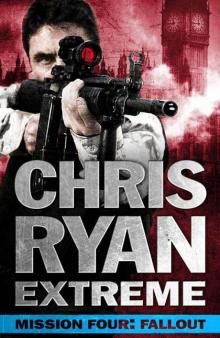 Chris Ryan Extreme: Hard Target: Mission Four: Fallout
Chris Ryan Extreme: Hard Target: Mission Four: Fallout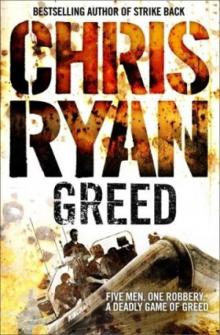 Greed mb-1
Greed mb-1 Alpha Force: Desert Pursuit
Alpha Force: Desert Pursuit Strike Back
Strike Back Greed
Greed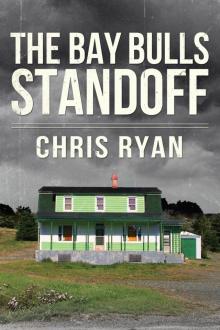 The Bay Bulls Standoff
The Bay Bulls Standoff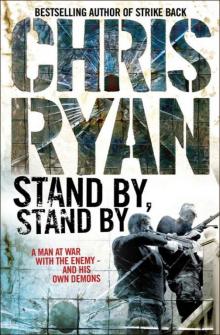 Stand By, Stand By gs-1
Stand By, Stand By gs-1 Outbreak
Outbreak Hunted
Hunted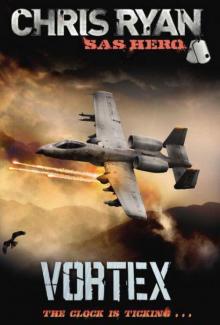 Vortex cr-4
Vortex cr-4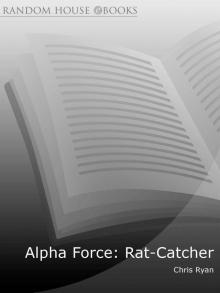 Rat-Catcher
Rat-Catcher Vortex
Vortex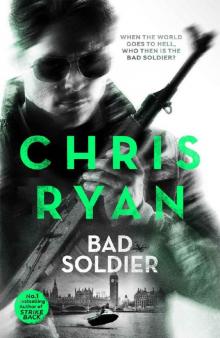 Bad Soldier
Bad Soldier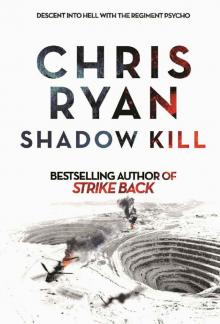 Shadow Kill: A Strikeback Novel
Shadow Kill: A Strikeback Novel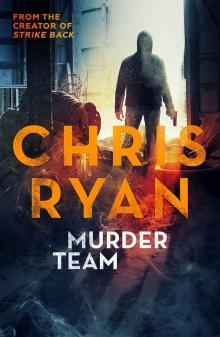 Murder Team (Kindle Single)
Murder Team (Kindle Single) One Good Turn
One Good Turn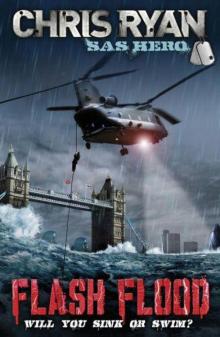 Flash Flood cr-1
Flash Flood cr-1 Night Strike
Night Strike Wildfire
Wildfire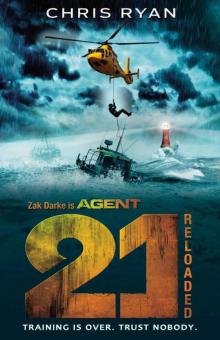 Agent 21: Reloaded: Book 2
Agent 21: Reloaded: Book 2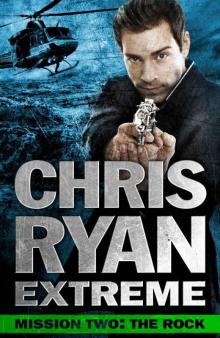 Chris Ryan Extreme: Hard Target: Mission Two: The Rock
Chris Ryan Extreme: Hard Target: Mission Two: The Rock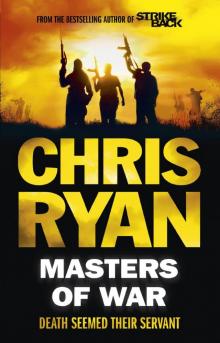 Masters of War
Masters of War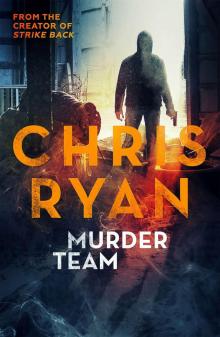 Murder Team
Murder Team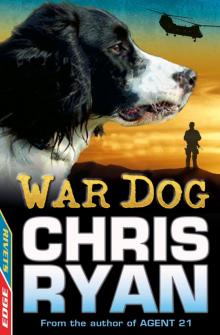 War Dog
War Dog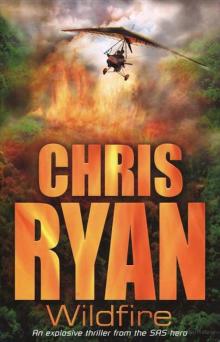 Wildfire cr-2
Wildfire cr-2 Survival
Survival The One That Got Away - Junior edition
The One That Got Away - Junior edition The Hit List
The Hit List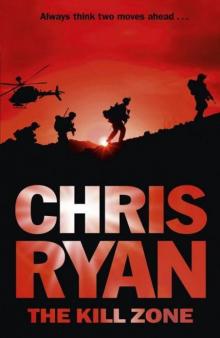 The Kill Zone
The Kill Zone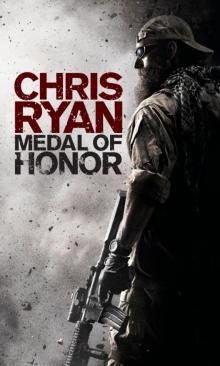 Medal of Honor
Medal of Honor Battleground
Battleground Twister
Twister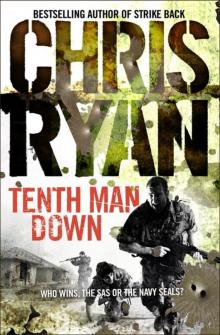 Tenth Man Down gs-4
Tenth Man Down gs-4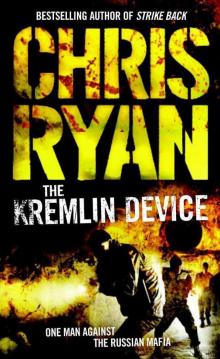 The Kremlin Device gs-3
The Kremlin Device gs-3 Hostage
Hostage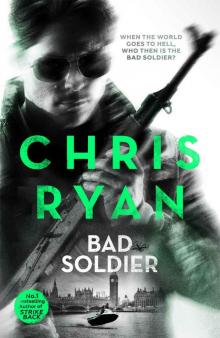 Bad Soldier: Danny Black Thriller 4
Bad Soldier: Danny Black Thriller 4 Alpha Force: Blood Money
Alpha Force: Blood Money Firefight
Firefight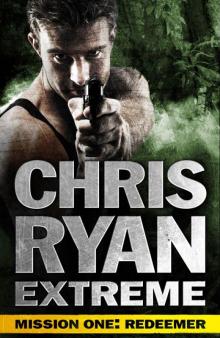 Chris Ryan Extreme: Hard Target: Mission One: Redeemer
Chris Ryan Extreme: Hard Target: Mission One: Redeemer Hit List
Hit List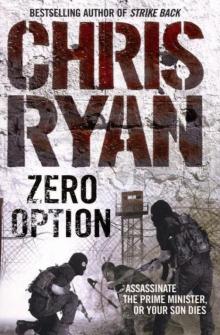 Zero Option gs-2
Zero Option gs-2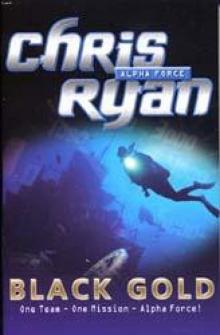 Black Gold
Black Gold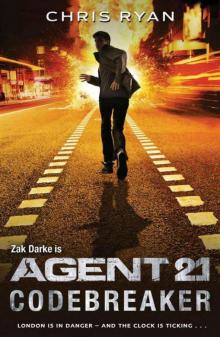 Agent 21: Codebreaker: Book 3
Agent 21: Codebreaker: Book 3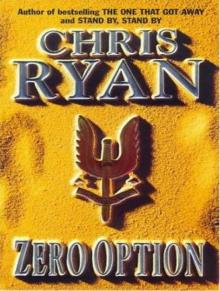 Zero Option
Zero Option Ultimate Weapon
Ultimate Weapon Tenth Man Down
Tenth Man Down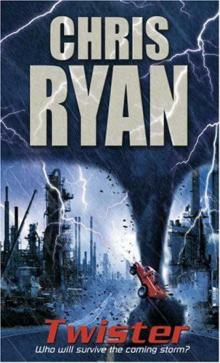 Twister cr-5
Twister cr-5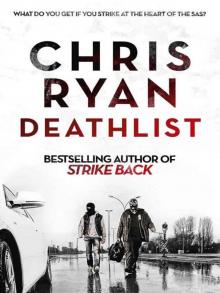 Deathlist
Deathlist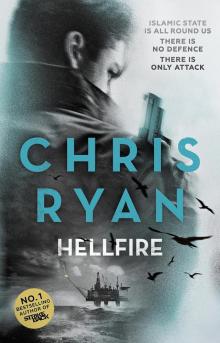 Hellfire
Hellfire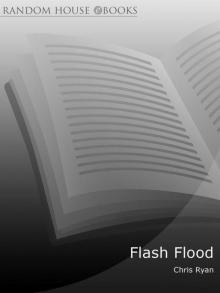 Flash Flood
Flash Flood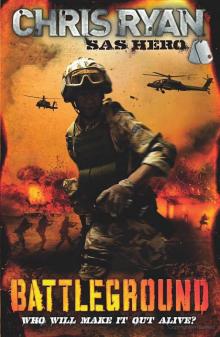 Battleground cr-6
Battleground cr-6 The Increment
The Increment